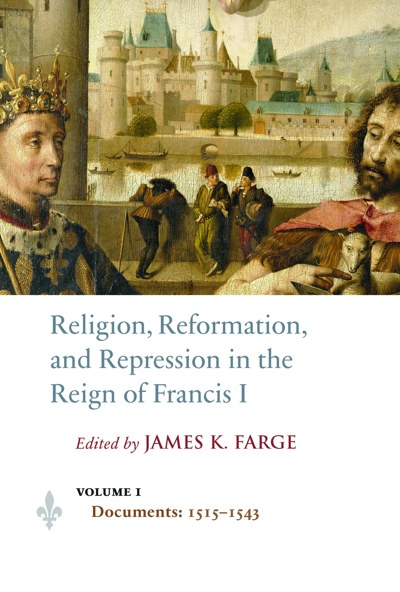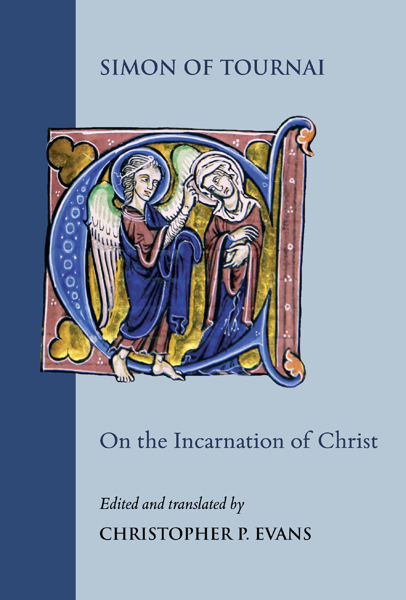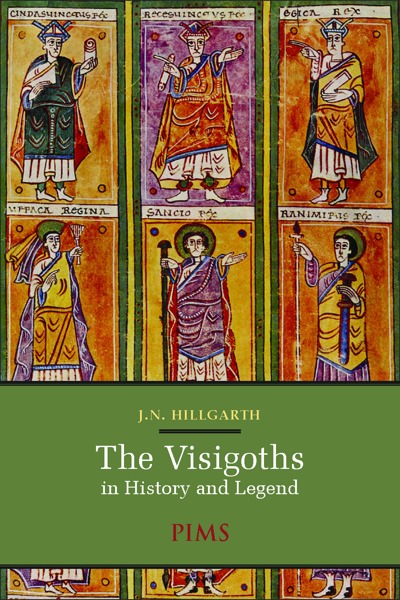
Religion, Reformation, and Repression in the Reign of Francis I: Documents from the Parlement of Paris, 1515–1547
James K. Farge
- Pages:2 vols, 1463 p.
- Size:150 x 230 mm
- Language(s):English, Middle French
- Publication Year:2015
- € 205,00 EXCL. VAT RETAIL PRICE
- ISBN: 978-0-88844-196-6
- Hardback
- Available
- France (c. 1501-1800)
- Heresies, persecutions of heterodoxy & sects
- Reformation & Counterreformation Theologies (c. 1300-1648)
- Western Church (general)
- Political & institutional history (c. 1501-1800)
- Cultural & intellectual history (c. 1501-1800)
- Religious history (c. 1501-1800)
- Historiography (c. 1501-1800)
"The Parlement of Paris in the reign of Francis I was placed in a particularly delicate position. On the one hand, it was confronted with an energetic and expansionist monarch, whose ambitions abroad led him to demand compromises in long-held Gallican principles in the court and (in due course) in the prosecution of heresy too. On the other, it was clear-sighted in its desire to seek God’s protection for the king and the realm, conscious of the historic role and destiny this represented, but aware that there were those in the king’s family and service who sought his favour and protection in order to advance evangelical and eventually protestant causes. This edition magnificently documents those tensions. It is unique in providing scholars with extensive, year-by-year documentary evidence for the court’s ways of proceeding in matters of heresy. It provides details on commissioners, plaidoyers, renvoi, torture, execution, etc. It is invaluable as a study in how the court recorded its decisions. It corrects the work of previous scholars in the area in a number of domains and, even in areas where we thought we knew the documentation quite well (such as. the Etienne Dolet affair), it provides new surprises. There is significant new material on the control of bookselling, rich documentation on the concerns about what was sung and placarded in the streets, and additional information about the role of inquisitors. The work complements James Farge’s previous studies, which have won a highly respected place in the literature, and these two volumes will take their place as the authoritative edition of the activities of the court in this period."
Mark Greengrass, The University of Sheffield
James K. Farge is a Fellow of the Pontifical Institute of Mediaeval Studies, Toronto. He is the editor of Students and Teachers at the University of Paris (2006) and also of two volumes of the proceedings (1990, 1994) of the Faculty of Theology at the University.
The vast treasure of manuscript archives of the Parlement of Paris – the Supreme Court of justice in ancien régime France – has been exploited over the centuries by a number of scholars in several disciplines. The notable exception is that very few historians of religion in sixteenth-century France have delved into these rich and remarkable resources. This edition of nearly 1200 documents – the great majority previously unpublished – is based on an examination of more than 100,000 manuscript pages in over a hundred of the Court’s registers and cartons.
The documents concern such issues and events as the Concordat of Bologna, the reformation of monasteries and priories, the confrontation between conservative and reform-minded Catholics, hundreds of trials of accused heretics (among them the trials and execution of Louis de Berquin and of Étienne Dolet), the placards of 1534, the censorship of books, the use of torture and capital punishment, royal and papal edicts, briefs, ordonnances, and letters relating to religion and the suppression of heresy, and the gradual but striking evolution of King Francis I from a policy of toleration to one of repression of the Reformation.
Published in the original Middle French, each document is preceded by a short descriptive title and, in most cases, a contextualizing headnote, and is thoroughly but discreetly annotated. A wide-ranging Introduction presents the organisation of the Parlement, its scope of authority and method of proceeding, and the historiography that has shaped our understanding of its reach. Three comprehensive indexes give access to the thousands of persons, places, and topics that appear in the documents.



